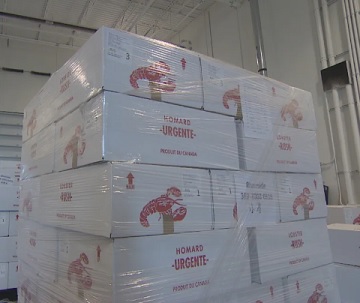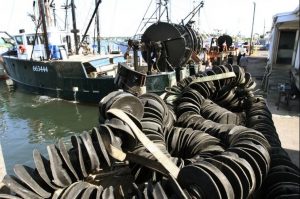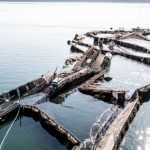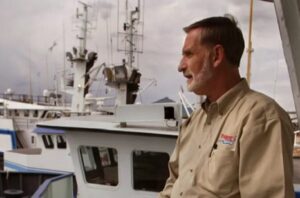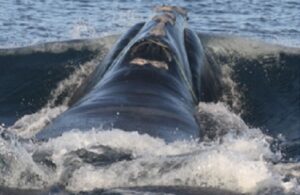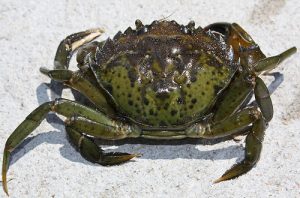Tag Archives: lobster industry
Trump’s tariff threats loom large over Newfoundland’s crab fishery
 Even though Newfoundland and Labrador’s snow crab season at least eight weeks away, Doug Trainor is hard at work getting ready for this year’s fishery. His boat, D.R.A Enterprises, is hoisted up on dry ground in Petty Harbour, where he’s replacing the engine and working with his son on other upgrades. It’s a big investment – tens of thousands of dollars – but after last year’s unrest in the crab fishery, which saw big protests at the Confederation Building in St. John’s, he says he felt like this season would be more predictable, safer and profitable. “We figured it would be good this year, this was going to be the year,” he said. “Then, all of a sudden, Trump came out.” U.S. president-elect Donald Trump’s threats of steep tariffs on Canadian products entering the United States has stirred a lot of industries in the country, but Newfoundland’s fishery is particularly susceptible. more, >>CLICK TO READ<< 07:43
Even though Newfoundland and Labrador’s snow crab season at least eight weeks away, Doug Trainor is hard at work getting ready for this year’s fishery. His boat, D.R.A Enterprises, is hoisted up on dry ground in Petty Harbour, where he’s replacing the engine and working with his son on other upgrades. It’s a big investment – tens of thousands of dollars – but after last year’s unrest in the crab fishery, which saw big protests at the Confederation Building in St. John’s, he says he felt like this season would be more predictable, safer and profitable. “We figured it would be good this year, this was going to be the year,” he said. “Then, all of a sudden, Trump came out.” U.S. president-elect Donald Trump’s threats of steep tariffs on Canadian products entering the United States has stirred a lot of industries in the country, but Newfoundland’s fishery is particularly susceptible. more, >>CLICK TO READ<< 07:43
New lobster minimum catch sizes could lead to industry change, Golden reacts DMR decision
 A potential change to the lobster industry would impact the allowable lobster catch size. Dozens of lobstermen who do not support the change spoke out at a Department of Marine Resources public hearing in Augusta on Thursday night. The public hearing discussed a proposal that would change the minimum allowable catch size for lobsters from 3 1/4 inches to 3 5/16 inches. A change of 1/16 of an inch may seem small, but to fishermen, it’s a big deal. “It’s our livelihoods you’re messing with,” lobsterman Wayne Delano said. “The question here is not will lobstermen and processors go out of business because of this increase, but rather how many will be put out of business because of this increase,” said Dustin Delano, lobsterman and chief operating officer at the New England Fishermen’s Stewardship Association. more, >>CLICK TO READ<< 08:35
A potential change to the lobster industry would impact the allowable lobster catch size. Dozens of lobstermen who do not support the change spoke out at a Department of Marine Resources public hearing in Augusta on Thursday night. The public hearing discussed a proposal that would change the minimum allowable catch size for lobsters from 3 1/4 inches to 3 5/16 inches. A change of 1/16 of an inch may seem small, but to fishermen, it’s a big deal. “It’s our livelihoods you’re messing with,” lobsterman Wayne Delano said. “The question here is not will lobstermen and processors go out of business because of this increase, but rather how many will be put out of business because of this increase,” said Dustin Delano, lobsterman and chief operating officer at the New England Fishermen’s Stewardship Association. more, >>CLICK TO READ<< 08:35
From boat sizes to waitlists, what lobster industry changes say about where fishery is headed
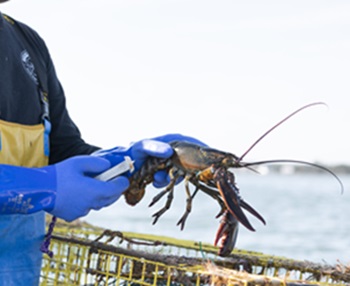 Wait times for a lobster fishing license, especially for those not born into a family of fishermen, used to exceed a decade in some parts of Maine, but the queues are getting shorter as fewer young people enter the fishery. Lobster boat captains often struggle to find enough sternmen to help and used lobster boats are taking longer to sell than they used to. The threat of climate change and more restrictive right whale protections, as well as several years of more modest landing totals, have some in the lobster industry second-guessing their future in the business, yielding subtle, but real, changes in the makeup of the fishery. In conversations with fishermen, a sense of uncertainty permeates. “It’s such an unstable way of life and it’s not getting any better,” said Nick Perreault, a fifth generation fisherman who captains a lobster boat out of Jonesport. more, >>CLICK TO READ<< 06:25
Wait times for a lobster fishing license, especially for those not born into a family of fishermen, used to exceed a decade in some parts of Maine, but the queues are getting shorter as fewer young people enter the fishery. Lobster boat captains often struggle to find enough sternmen to help and used lobster boats are taking longer to sell than they used to. The threat of climate change and more restrictive right whale protections, as well as several years of more modest landing totals, have some in the lobster industry second-guessing their future in the business, yielding subtle, but real, changes in the makeup of the fishery. In conversations with fishermen, a sense of uncertainty permeates. “It’s such an unstable way of life and it’s not getting any better,” said Nick Perreault, a fifth generation fisherman who captains a lobster boat out of Jonesport. more, >>CLICK TO READ<< 06:25
In once tranquil N.S. town, intimidation in the lobster industry now all too common
 Standing by a bullet hole in his dining room wall, lobster buyer Geoffrey Jobert says such attacks have become an all-too-familiar reality in Nova Scotia’s largest fishery. The 30-year-old and his younger brother came to the area from Halifax to take over his father’s processing plant five years ago and now employ 100 people. He’s enjoyed making friends in the francophone town and paddling along a stunning beach near his home when he has a few spare hours. But last year, threats started after he agreed to buy the catch of a licensed, commercial harvester who was no longer willing to provide his catch to facilities allegedly purchasing illegally caught lobster. And Jobert soon learned he wasn’t the only person in the communities along the Acadian shore who experienced late-night attacks. more, >>CLICK TO READ<< 06:35
Standing by a bullet hole in his dining room wall, lobster buyer Geoffrey Jobert says such attacks have become an all-too-familiar reality in Nova Scotia’s largest fishery. The 30-year-old and his younger brother came to the area from Halifax to take over his father’s processing plant five years ago and now employ 100 people. He’s enjoyed making friends in the francophone town and paddling along a stunning beach near his home when he has a few spare hours. But last year, threats started after he agreed to buy the catch of a licensed, commercial harvester who was no longer willing to provide his catch to facilities allegedly purchasing illegally caught lobster. And Jobert soon learned he wasn’t the only person in the communities along the Acadian shore who experienced late-night attacks. more, >>CLICK TO READ<< 06:35
$5.4 million to further innovative research and outreach in support of the lobster industry and fishing communities
 The American lobster fishery and American lobster fishery in the Gulf of Maine, Georges Bank and southern New England continue to face uncertainties due to environmental and socio-economic changes. Such challenges underscore the need for continued research and engagement to not only understand the fishery’s current state but also prepare for its future state. Since 2019, Sea Grant’s American Lobster Initiative has addressed critical knowledge gaps about the American lobster and its fishery facing a dynamic and changing environment. The Initiative supports a regional extension program in the Northeast and a national research competition. Fifteen emerging research projects were selected in 2023 and 2024 for $4.6 million in federal funding by the NOAA National Sea Grant College Program. The projects were chosen through a competitive process, including review by subject matter experts, and require at least a 50-percent match in non-federal funds. more, >>CLICK TO READ<< 10:03
The American lobster fishery and American lobster fishery in the Gulf of Maine, Georges Bank and southern New England continue to face uncertainties due to environmental and socio-economic changes. Such challenges underscore the need for continued research and engagement to not only understand the fishery’s current state but also prepare for its future state. Since 2019, Sea Grant’s American Lobster Initiative has addressed critical knowledge gaps about the American lobster and its fishery facing a dynamic and changing environment. The Initiative supports a regional extension program in the Northeast and a national research competition. Fifteen emerging research projects were selected in 2023 and 2024 for $4.6 million in federal funding by the NOAA National Sea Grant College Program. The projects were chosen through a competitive process, including review by subject matter experts, and require at least a 50-percent match in non-federal funds. more, >>CLICK TO READ<< 10:03
Long Island Sound Lost Its Lobster Fishery. Is Cape Cod Bay Next?
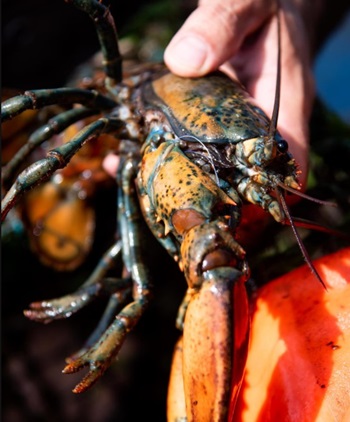 Catches in Cape Cod Bay were good for many years, and prices were good, too. But lobstermen here started worrying in the late 1990s when the fishery collapsed in Long Island Sound. And that worry hasn’t gone away, because environmental changes here resemble those that were affecting Long Island Sound back then. In the aftermath of Tropical Storm Floyd in August 1999, the lobsters in Long Island Sound started coming up dead or lethargic, not making it back to the docks alive. Fall landings for all Connecticut ports dropped between 91 and 99 percent that year, according to a joint report of the state’s dept. of environmental protection and marine fisheries office published in 2000. Fast forward 25 years: hopes for a Long Island Sound population rebound have not panned out. A December 2021 report in the Portland Press Herald introduced Michael Grimshaw this way: “Grimshaw is believed to be the last full-time commercial lobsterman in Connecticut.” His traps used to bring in up to a few thousand pounds a day, wrote reporter David Abel. A good day was now getting him 50 pounds, Grimshaw told him. more, >>CLICK TO READ<< By Capt. Mike Rathgeber 08:40
Catches in Cape Cod Bay were good for many years, and prices were good, too. But lobstermen here started worrying in the late 1990s when the fishery collapsed in Long Island Sound. And that worry hasn’t gone away, because environmental changes here resemble those that were affecting Long Island Sound back then. In the aftermath of Tropical Storm Floyd in August 1999, the lobsters in Long Island Sound started coming up dead or lethargic, not making it back to the docks alive. Fall landings for all Connecticut ports dropped between 91 and 99 percent that year, according to a joint report of the state’s dept. of environmental protection and marine fisheries office published in 2000. Fast forward 25 years: hopes for a Long Island Sound population rebound have not panned out. A December 2021 report in the Portland Press Herald introduced Michael Grimshaw this way: “Grimshaw is believed to be the last full-time commercial lobsterman in Connecticut.” His traps used to bring in up to a few thousand pounds a day, wrote reporter David Abel. A good day was now getting him 50 pounds, Grimshaw told him. more, >>CLICK TO READ<< By Capt. Mike Rathgeber 08:40
Commercial lobster fishers want total catch cut to help save WA fishery
 Commercial fishers in Western Australia’s $285 million lobster industry say warning bells are ringing for the sector’s future sustainability, despite reassurances from state government scientists that stocks are at healthy levels. The commercial lobster industry is concerned due to the number of baby lobster, known as puerulus, being found along the coast, along with falling catch rates and revised economic modelling. As a result, the industry has requested its total catch be dropped next season from the current limit of 7,300 tonnes to 6,800 tonnes. Cervantes based fisher Michael Thompson supported the catch reduction and said it could have gone lower. “Our puerulus since 2007 till today is 50 per cent lower than what we used to receive back to the coast to our collectors,” he said. Photos, more, >>CLICK TO READ<< 10:02
Commercial fishers in Western Australia’s $285 million lobster industry say warning bells are ringing for the sector’s future sustainability, despite reassurances from state government scientists that stocks are at healthy levels. The commercial lobster industry is concerned due to the number of baby lobster, known as puerulus, being found along the coast, along with falling catch rates and revised economic modelling. As a result, the industry has requested its total catch be dropped next season from the current limit of 7,300 tonnes to 6,800 tonnes. Cervantes based fisher Michael Thompson supported the catch reduction and said it could have gone lower. “Our puerulus since 2007 till today is 50 per cent lower than what we used to receive back to the coast to our collectors,” he said. Photos, more, >>CLICK TO READ<< 10:02
Lobster fishermen say tiny change in legal sizes could disrupt imperiled industry
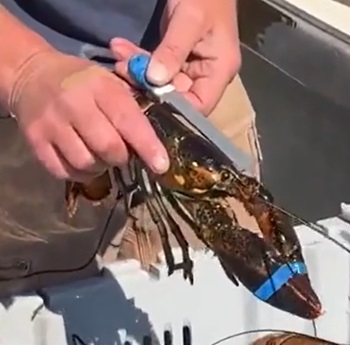 Gerry Cushman has seen Maine’s iconic lobster industry survive numerous threats in his three decades on the water, but the latest challenge, which might sound tiny, could be the biggest one yet. Lobster fishing is a game of inches, and the number of inches is about to change. Fishing regulators are instituting a new rule that lobster fishermen must abide by stricter minimum sizes for crustaceans they harvest. In addition to causing a dispute between fishermen and regulators, the change has led to confusion about the ramifications for international trade in one of the world’s most popular seafoods. “We don’t need any more, really, on our plate. It’s just a lot going on, one fight after another,” Cushman, 55, a boat captain who fishes out of Port Clyde, said. “We don’t need anything in the marketplace to lower the price of lobsters.” more, >>CLICK TO READ<< 09:59
Gerry Cushman has seen Maine’s iconic lobster industry survive numerous threats in his three decades on the water, but the latest challenge, which might sound tiny, could be the biggest one yet. Lobster fishing is a game of inches, and the number of inches is about to change. Fishing regulators are instituting a new rule that lobster fishermen must abide by stricter minimum sizes for crustaceans they harvest. In addition to causing a dispute between fishermen and regulators, the change has led to confusion about the ramifications for international trade in one of the world’s most popular seafoods. “We don’t need any more, really, on our plate. It’s just a lot going on, one fight after another,” Cushman, 55, a boat captain who fishes out of Port Clyde, said. “We don’t need anything in the marketplace to lower the price of lobsters.” more, >>CLICK TO READ<< 09:59
Maine lobster industry reacts to right whale found entangled in rope
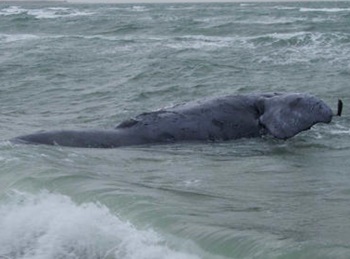 Maine’s lobster industry is responding following the discovery of a dead North Atlantic right whale near Martha’s Vineyard last month. According to federal authorities, the whale was entangled in fishing rope, including portions traced back to Maine. While NOAA has yet to determine the exact cause of the whale’s demise, Maine lobstermen are fearing potential blame. “They’re going to say that the rope, you know, caused harm to the whale, and over time, it just was a very slow death,” said John Drouin, a Lobsterman from Cutler with over 40 years of experience. The incident marks the first documented interaction between a right whale and Maine fishing gear in over two decades. more, >>click to read<< 11:49
Maine’s lobster industry is responding following the discovery of a dead North Atlantic right whale near Martha’s Vineyard last month. According to federal authorities, the whale was entangled in fishing rope, including portions traced back to Maine. While NOAA has yet to determine the exact cause of the whale’s demise, Maine lobstermen are fearing potential blame. “They’re going to say that the rope, you know, caused harm to the whale, and over time, it just was a very slow death,” said John Drouin, a Lobsterman from Cutler with over 40 years of experience. The incident marks the first documented interaction between a right whale and Maine fishing gear in over two decades. more, >>click to read<< 11:49
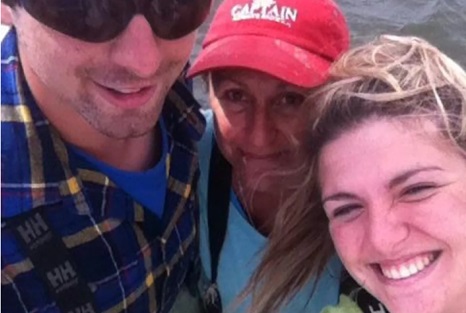
My mom made waves as captain of her lobster boat. I’m proud to be her deckhand
A sou’easter blew with force, stronger by the second, making the waves choppy and short. My mom, laughing as she tends to in these situations, said, “Ya gotta drive ‘er it like you stole ‘er!” We were sailing at a good clip to keep her lobster boat steady and skip over the waves. A bit nervously, I laughed along with her, somewhat glad that we were cutting our fishing day short as we bounced among the tumultuous whitecaps. I was sitting at the lunch table where we sometimes enjoy a meal together as a break from the day. All seemed relatively fine, albeit a bit rough, until we had to turn starboard at a point where one current meets the other in the gully. Rather than taking the waves head-on, we were suddenly being slammed port side. photos, Video, more, >>click to read<< 07:46
Interview: Massachusetts lobstermen want to invent a better lobster trap
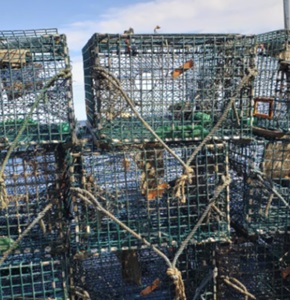 For years, right whale advocates and engineers have been trying to develop new lobster fishing gear designed to prevent whales from entanglements. But most local lobstermen say they’re against this so-called “on demand” fishing gear that’s been created. Now, as CAI’s Eve Zuckoff reports, lobstermen have decided to come up with their own technology. Eve, you were the first to report this, thanks for being here this morning. Eve Zuckoff: Thanks for having me. Patrick Flanary: So the Massachusetts lobstermen’s association has just been awarded a $1.2 million grant to develop new fishing gear. What’s their proposal? more, >>click to read<< 09:47
For years, right whale advocates and engineers have been trying to develop new lobster fishing gear designed to prevent whales from entanglements. But most local lobstermen say they’re against this so-called “on demand” fishing gear that’s been created. Now, as CAI’s Eve Zuckoff reports, lobstermen have decided to come up with their own technology. Eve, you were the first to report this, thanks for being here this morning. Eve Zuckoff: Thanks for having me. Patrick Flanary: So the Massachusetts lobstermen’s association has just been awarded a $1.2 million grant to develop new fishing gear. What’s their proposal? more, >>click to read<< 09:47
Maine lobstermen signal opposition to participating in ropeless testing program
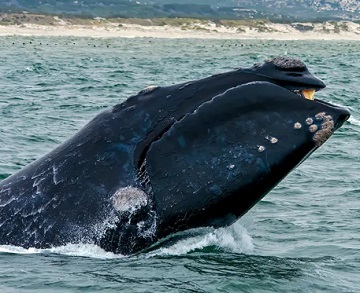 Maine lobstermen are signaling their hesitation to participate in a multimillion-dollar program the state is launching to test new ropeless technology that the federal government soon may require to protect the endangered North Atlantic right whale. Lobstermen have been largely unhappy with the regulations, fearing that the regulations will destroy the lobstering industry as they know it. Maine’s congressional delegation succeeded in securing legislative approval for a reprieve that stalls the regulations from going into effect until Jan. 1, 2029. Industry groups also have succeeded in taking NOAA to court, where the regulations are still tied up. Even so, the clock is ticking and the Department of Marine Resources wants to be prepared for what it expects is an inevitable regulation. more, >>click to read<< 06:31
Maine lobstermen are signaling their hesitation to participate in a multimillion-dollar program the state is launching to test new ropeless technology that the federal government soon may require to protect the endangered North Atlantic right whale. Lobstermen have been largely unhappy with the regulations, fearing that the regulations will destroy the lobstering industry as they know it. Maine’s congressional delegation succeeded in securing legislative approval for a reprieve that stalls the regulations from going into effect until Jan. 1, 2029. Industry groups also have succeeded in taking NOAA to court, where the regulations are still tied up. Even so, the clock is ticking and the Department of Marine Resources wants to be prepared for what it expects is an inevitable regulation. more, >>click to read<< 06:31
NFWF grants support Maine lobster industry participation in alternative fishing gear testing
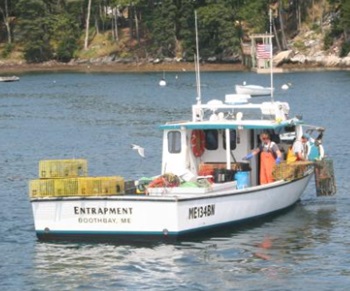 “Alternative gear, also known as “on demand” gear is a long way from being viable for fishermen or for whales,” said DMR Commissioner Patrick Keliher. “It is my goal to make sure we know what gear works, and more importantly what doesn’t work, so when future draft federal regulations come forward, we can draw on the real-world experience of fishermen when determining what the next steps should be.” One award of $1,999,992 will support the evaluation of acoustic geolocation systems that locate gear on the bottom without the benefit of surface buoys which are part of traditional gear configurations. Regional partners will include the Island Institute, Maine Center for Coastal Fisheries, Maine Coast Fishermen’s Association, the Sunrise County Economic Council, and the Gulf of Maine Lobster Foundation. more, >>click to read<< 06:09
“Alternative gear, also known as “on demand” gear is a long way from being viable for fishermen or for whales,” said DMR Commissioner Patrick Keliher. “It is my goal to make sure we know what gear works, and more importantly what doesn’t work, so when future draft federal regulations come forward, we can draw on the real-world experience of fishermen when determining what the next steps should be.” One award of $1,999,992 will support the evaluation of acoustic geolocation systems that locate gear on the bottom without the benefit of surface buoys which are part of traditional gear configurations. Regional partners will include the Island Institute, Maine Center for Coastal Fisheries, Maine Coast Fishermen’s Association, the Sunrise County Economic Council, and the Gulf of Maine Lobster Foundation. more, >>click to read<< 06:09
At Mackerel Cove wharf, Arizona-based lobster chain learns as it grows
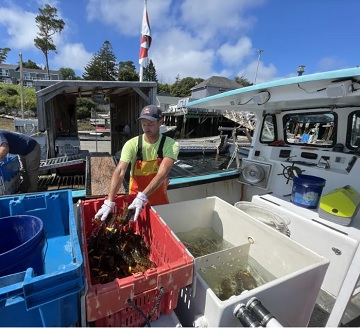 There, an upstart fast food company called Angie’s Lobster offers rolls filled with a quarter-pound of New England’s favorite crustacean that’s served warm and buttered, chilled, grilled or fried. Add in a drink, fries and their trademark sauce and the total comes to — wait for it — $9.99. Is there a catch? Yep, in more ways than one. It all begins with Harpswell lobster boats and a historic wharf nestled into Mackerel Cove on Bailey Island. In the summer of 2022, Angie’s bought a long-standing family lobster pound there and established the first link in a supply chain that is bringing Vacationland lobster to Arizona drive-thru diners at eye-poppingly low prices. Tony Christofellis, who founded the company and named it for his late mother, says business is good and getting better. He says buying the Bailey Island wharf was “the coolest thing we’ve ever done.” Photos, >>click to read<< 08:10
There, an upstart fast food company called Angie’s Lobster offers rolls filled with a quarter-pound of New England’s favorite crustacean that’s served warm and buttered, chilled, grilled or fried. Add in a drink, fries and their trademark sauce and the total comes to — wait for it — $9.99. Is there a catch? Yep, in more ways than one. It all begins with Harpswell lobster boats and a historic wharf nestled into Mackerel Cove on Bailey Island. In the summer of 2022, Angie’s bought a long-standing family lobster pound there and established the first link in a supply chain that is bringing Vacationland lobster to Arizona drive-thru diners at eye-poppingly low prices. Tony Christofellis, who founded the company and named it for his late mother, says business is good and getting better. He says buying the Bailey Island wharf was “the coolest thing we’ve ever done.” Photos, >>click to read<< 08:10
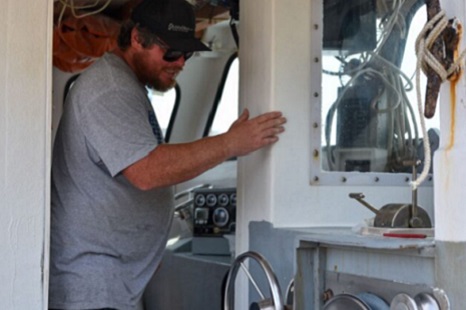
His passion is lobstering, his worry is the future
Christopher Robert Tobey Jr. was born on July 22, 1991, in Portland, into a family of fishermen. He spent a lot of time on the docks and water. He watched his father and grandfather talk with other fishermen and learned the lingo. He also learned a lot by going to other docks because everyone does things differently. “As a little kid, I always knew who everyone was and what their boat was,” he said. Tobey’s father always told him fishing wasn’t easy, but it was there if he wanted it. “I started lobster fishing because my father was a lobster fisherman, and when I was a kid that’s all I wanted to do,” he said. However, fishing is dangerous. And on May 11, 2008, Tobey’s life changed forever. “It was Mother’s Day, a Sunday, and we went out to go fishing to fill some orders for a couple of my dad’s friends,” Tobey said. “I remember it was me, my father and another fisherman, Robbie Blackburn. He was working for my dad. We went out and it was a great day and the weather started to turn.” >>click to read<< 09:53
Lobster ‘red list’ draws ire, lawsuit from Maine fishers
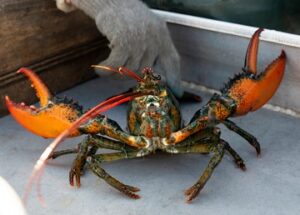 A coalition representing the Maine lobster industry is suing an aquarium on the other side of the country for recommending seafood customers avoid buying a variety of lobster mostly harvested in their state. Industry groups including Maine Lobstermen’s Association are suing the Monterey Bay Aquarium in California for “defamation,” arguing in a lawsuit filed Monday that their prized catch shouldn’t be on a “red list” published by Seafood Watch, a conservation program it operates. Last year, Seafood Watch put lobster from the U.S. and Canada on its list of seafood to avoid due to the threat posed to rare whales by entanglement in fishing gear used to harvest American lobster, the species that makes up most of the U.S. lobster market. >click to read< 15:47
A coalition representing the Maine lobster industry is suing an aquarium on the other side of the country for recommending seafood customers avoid buying a variety of lobster mostly harvested in their state. Industry groups including Maine Lobstermen’s Association are suing the Monterey Bay Aquarium in California for “defamation,” arguing in a lawsuit filed Monday that their prized catch shouldn’t be on a “red list” published by Seafood Watch, a conservation program it operates. Last year, Seafood Watch put lobster from the U.S. and Canada on its list of seafood to avoid due to the threat posed to rare whales by entanglement in fishing gear used to harvest American lobster, the species that makes up most of the U.S. lobster market. >click to read< 15:47
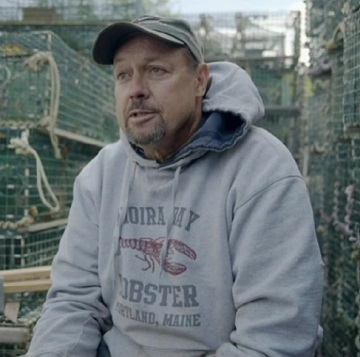
Lobster industry says regulations to save right whales will push them out of business
Lobsters support about 15,000 jobs and contribute more than a billion dollars to the Maine economy. And yet the industry sees itself in an existential battle, pitted against a rare species fighting its own existential battle. North Atlantic right whales, critically endangered, fewer than 350 individuals remain. And they are dying at a devastating rate. Janet Coit, Assistant Administrator of Fisheries, National Oceanic and Atmospheric Administration: If we don’t stabilize and begin the recovery, they will be gone within a couple of decades. They will be extinct. They will be wiped off this Earth. And we want to do everything we can to prevent that from happening. >video< 10:30
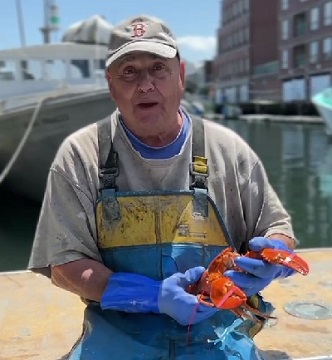
Lobsterman catches 3rd rare orange lobster in a week
A lobsterman working out of Portland caught his third rare orange lobster in a week on Thursday. Capt. Peter Pray showed up at Harbor Fish Market with another orange lobster, after catching two last Friday, according to CBS 13. Pray reportedly used the same trap he used to catch the first two. Pray caught the lobster using the same trap that he used to catch the first two. Photos, video, >click to read< 09:05

Rockland Council holds off on resolve that supports lobster industry, dismisses right whale concerns
The City Council voted Monday evening, June 12, to postpone for two months a resolve to support the lobster industry out of concern that the language goes too far in dismissing concerns about the impact on the endangered right whale. Councilor Austin was unsuccessful in removing some of the language from the resolve concerning right whales. That vote was 3-2 against removing the language with the mayor supporting Austin’s effort. The statements at issue in the resolve were ones that dismissed the concerns that environmentalists have about the lobster industry’s impact on right whales. >click to read< 08:02
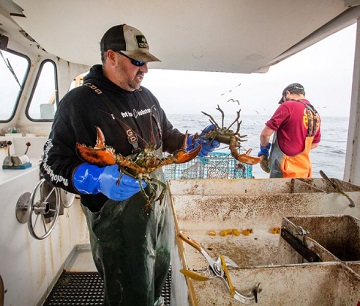
Canadian and American lobster industry confronts ‘ropeless’ traps after whale entanglements
Injuries to endangered North Atlantic Right Whales ensnared in fishing gear have fueled a prominent campaign by environmental groups to pressure the industry to adopt on-demand equipment that only suspends ropes in the water briefly before traps are pulled from the water. To address the problem, the U.S. and Canadian governments have imposed new regulation on lobster and crab fisheries in recent years, including the use of weak links in rope that break if a whale swims through, color-coded rope for tracing, adding more traps per buoy line, and zone closures during whale migration. Washington and Ottawa are now promoting ropeless fishing as a possible long-term solution. But lobstermen, particularly in Maine where 80% of U.S. lobster is caught, are not enthusiastic. >click to read< 08:49

Maine: Fishing industry forum May 24
Our way of life up and down the Maine coast is under attack. Families that have made their living in the lobster industry for generations are on the road to extinction. If the federal government has their way, pending regulations will force the lobster industry out of business and the Gulf of Maine will be reserved for offshore wind. The Lincoln County Republicans are hosting an event on May 24 where the public can hear, firsthand, from three prominent men in the Maine fishing industry – Representative Billy Bob Faulkingham, Dustin Delano and Jason Joyce. The event will be held at Coastal Christian School, 574 N. Nobleboro Road, Waldoboro. Doors open at 5:30 p.m. >click to read< 15:52

Maine lawmakers call for more hearings on whale rules
Members of Maine’s congressional delegation are asking the federal government to hold more hearings on whale protection rules to gauge the impact on the state’s commercial fishing industry. In a letter to the National Marine Fisheries Service, Sens. Susan Collins, R-Maine and Angus King, I-Maine, said the federal agency’s decision to hold only one public hearing last week on the new regulations “unacceptable” and called for more engagement with the lobster industry. The lawmakers wrote that the 90% risk reduction target fisheries regulators are pursuing over the next two years to protect critically endangered North Atlantic right whales would be a “death knell” for lobstermen. >click to read< 19:06

Lobster harvesters worry about survival of their livelihoods
The state’s lobster industry is bracing as federal regulators consider additional requirements they claim are needed to protect the endangered North American right whale, proposals many fear could spell doom for the industry and the coastal communities that it supports. Squaring off in this battle are national environmental and animal rights organizations versus Maine and its lobster harvesters. The legal war began in January 2018 when the Center for Biological Diversity, the Defenders of Wildlife, the Humane Society of the United States, and the Conservation Law Foundation filed a lawsuit in the U.S. District Court of D.C. against the U.S. Department of Commerce and the NOAA. The environmental and animal rights groups claimed the federal agencies had not done enough to protect the North Atlantic right whale from lobster harvesting. >click to read< 12:42

Letter to the Editor: The big-money green-lie
Dear Editor: It’s the big-money green-lie. Maine lobstermen are not killing whales. Progressive, woke Democrats climate change scams are killing the heart and soul of Maine. No evidence. Zero whales have been killed in this century by lobster gear entanglements. Solar and wind equal a financial bonanza for politicians, long-standing innocuous traditions are standing (fishing) in their way. No leadership. Elected officials sworn-in to represent and protect are cashing-in on special interest, new-green deal-threats that do not exist. >click to read< By Dave Gregg

On The Ropes – Federal court rules against lobster industry in appeal of whale protection regulations
“Obviously, it’s devastating to the lobster industry,” Stonington Town Manager Kathleen Billings told the Islander. Stonington lands by far the most lobsters in the state. In total, Maine lobstermen added an estimated $724,949,426 worth of lobster landings to the state commercial fishery in 2021. “We have a lot at stake,” Billings continued. “[Lobstering] makes up $60 [million] to $70 million to our economy and to have this recent ruling, and also too with the Seafood Watch list designation, they pretty much put a torch to our industry and burnt it to the ground for us.” >click to read< 08:55

Massachusetts: New relief fund would buoy lobster industry
A proposed state fund would provide financial relief to commercial lobstermen whose livelihoods are being impacted by state and federal regulations aimed at protecting critically endangered north Atlantic right whales. Tucked into a $52.7 billion state budget awaiting action by Gov. Charlie Baker is a proposal to create a new grant program with $500,000 in initial funding. The plan calls for providing grants of up to $5,000 to licensed lobstermen to help offset the cost of purchasing new gear and equipment needed to comply with the new whale protection rules. The grant money must be distributed in a “geographically equitable manner” under the proposal. Senate minority leader Bruce Tarr, R-Gloucester, who pushed for the funding, said it will help buoy lobstermen who are struggling to afford the expense of upgrading their gear and equipment. >click to read< 17:50
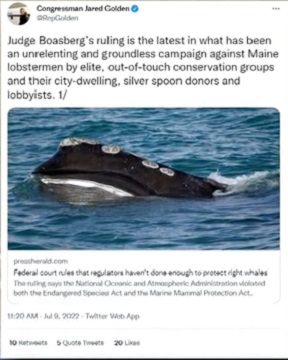
Maine lobster industry braces for tough season after back-to-back legal losses
“We recently got our license to be able to start processing small amounts on site, so that is cooking the lobster and picking out the meat … in hopes of taking out one step,” Jillian Robillard said. A step that she said could give lobstermen another 25 to 50 cents per animal. “That would really be a gamechanger for some of these guys,” Robillard said. “This year has been really tough so far … we’re banking on the fall season to give these guys two-thirds of their income … but with the closures and stuff we’re just not going to see that happen.” The closure she is talking about is the latest development in three lawsuits involving Maine lobstermen. Two of which that have recent rulings within the last week overturned in favor of environmental groups. >click to read< 11:13

Lobster industry and lawmakers await court decision to determine legality of new restrictions
Maine and Massachusetts harvest more than 90% of the American lobsters sold in the U.S. and most lobstermen and New England lawmakers want to keep it that way. Over the past year, a dispute over new federal regulations on Maine’s lobster industry, intended to protect the endangered North Atlantic Right Whale,,, Mike Sargent became the captain of his own boat at 15. The 29-year-old is worried, however, that if regulations adopted by the National Oceanic and Atmospheric Administration in 2021 are ruled lawful by the U.S. District Court of the District of Columbia, that more expensive and stricter regulations could follow. “There’s talks of ropeless fishing and so on, and those are astronomically expensive and quite frankly could bankrupt this industry at the stroke of a pen,” Sargent said. Massachusetts lobsterman Dave Casoni said that it would cost lobstermen between $500,000-$600,000 to make the switch to ropeless traps, and if passed Casoni believes it could bankrupt the industry. Video, >click to read< 09:16







